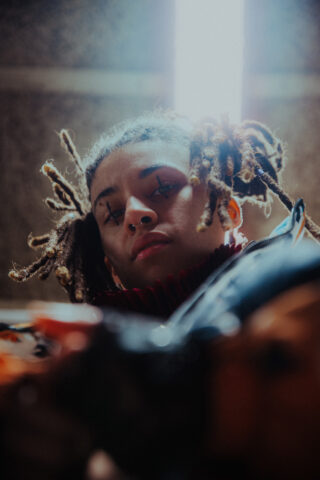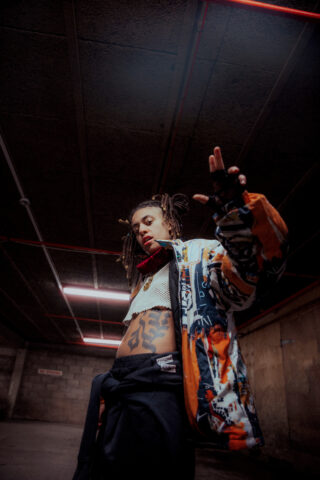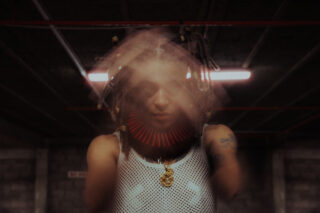Grove: Bristol’s radical new voice in queer dancehall
"These tunes are a statement of who I am, not necessarily reflective of everyone who’s queer and Black"

"These tunes are a statement of who I am, not necessarily reflective of everyone who’s queer and Black"
“It’s never been a conscious thing. It’s just needing to express whatever anger or resentment I’ve got piling up inside, and working out in what ways I can do that.”
I’m speaking to Grove on the nature of being a multi-disciplinary artist. Seemingly as comfortable on mic duties as they are building beats, happy behind the decks one minute and then a magnetic presence centre stage seconds later, their blend of high-energy live performance, anarchic club music and socio-political lyrics have seen them as a growing force in the UK underground. The recent release of SPICE, an EP of unabashedly queer dancehall cuts, on Bristol’s DIY imprint Bokeh Versions has only helped raise the temperature. We sit down to discuss small towns, the essential value of community, and how it’s sometimes nice to be reminded of how little you know.
Grove’s first exposure to wider prominence was with the release of 2021’s Queer + Black, an entirely self-produced EP that, in their own words, “serves as an introduction to their experience of the world.” A clear statement of intent, the project exhilarates with its directness, be it the proud defiance of ‘Black’ or the playful yet subversive flip of dancehall conventions on ‘Sticky’, replacing the often macho, and occasionally deeply homophobic, lyrics often heard in that genre with something equally as sexual, but more joyfully inclusive. I ask Grove if this direct approach was intended from the beginning.
“I didn’t start writing it with an overarching concept,” they explain. “I wrote the last track ‘Black’ as a response to the Colston statue being dragged down and thrown in the river. It was a beautiful moment for lots of people of colour to see. That rooted a sense of blackness within the collection of songs. Then it dawned on me that the other songs are pretty gay. At the time I was reading a load of [Black liberation activist, radical feminist and legendary scholar] Angela Davis, and I was like ‘Oh, shit, this all kind of ties into that’. I hadn’t pieced it all together before. But really, these tunes are a statement of who I am, not necessarily reflective of everyone who’s queer and Black. It’s me really owning both my queerness and my blackness, two things that I’ve wrestled with my entire life, wondering how rooted I am in either community. This was my outward cathartic expression, telling myself ‘I am rooted in this, I am confident in myself’. And I wanted to share that with the world.”
While lyrically weighty, the release still has one foot firmly in the dance, and it’s perhaps this combination that makes the whole thing work so well. Production-wise, the arrangements display a versatility that eschews rigid genre confines in favour of playful experiments with combative drum and bass breakbeats and blown-out club mutations. There’s also a clear embrace of pop sensibilities across the tracks, at points bringing to mind the vocal experimentation of Imogen Heap (on ‘Fuck Ur Landlord’) or the bashment-infused UKG of Ms. Dynamite.
“[When I was younger] I was fully into pure pop music: Lady Gaga, Beyonce, Lana Del Rey,” they say. It’s an intriguing amalgamation that blurs the lines between the personal and the political, and paints a vivid portrait of its author across just five tracks.


Though now Bristol-based, Grove grew up in the nearby town of Cheltenham, “known for horse racing and being full of posh people. Like, full to the brim,” Grove laughs. “But there’s a stark divide between people who have loads of shit, and those that don’t. In my early teens, everything about it just felt off. But I didn’t have the political language to really describe it.”
Likewise, as a creative hub, the town also proved uninspiring. “There were plenty of dude-y guitar bands, and not much else. I definitely didn’t see myself represented in the music scene there at all,” they explain. Besides this, Grove nonetheless engaged with the scene, joining a band and attempting to find a way to develop musically, adapting to what was available. Through the years, this search shifted from guitar bands, to singer-songwriter, to open mic poetry; for many young people who struggle to fit into their surroundings while remaining true to themselves, it’s a familiar trajectory.
A formative guiding voice came in the shape of producer and community musician Malaki Patterson, creative director of Gloucestershire youth organisation The Music Works, which provides support for young people in the local area, allowing space to nurture talent where it may be lacking elsewhere. The two connected when Grove took a spur-of-the-moment audition for a folk group.
“I didn’t even listen to folk,” they admit with a smile. He suggested they weren’t the right fit for the group, but that they should meet, and offered access to a studio to record some demos. After the initial session, Patterson saw potential in Grove, particularly their DIY approach.
“I’d been making songs on GarageBand on my iPhone. I brought them to the session and he was like, ‘What? You made this on your phone? We need to help you build this,’” they recall. “He ended up taking me into the community studio, and gave me a laptop. He just gave me space.” Acting as a mentor to Grove from the age of 17, it’s clear the relationship had a lasting impact on them. “I’ve learned so much from him, not only about music, but about community values and skill-sharing. He’s doing so much work there for underfunded music. I want to give credit to those people and not to the rest of the town. It doesn’t feel like the rest of the town deserves it.”
Following this, things began taking shape; the space and equipment allowed for Grove’s rudimental iPhone sketches to build into more fully-realised productions. Around this time Grove also began working with frequent collaborator Diessa, another artist currently pushing forward-thinking sounds, with releases on labels like Edited Arts and All Centre. They worked under the name BAAST, creating what Grove describes as “dark, weird bass-heavy electronic music, with depressing lyrics reflecting where we were at the time.”
Alongside this, visits to Bristol became more frequent. “I started MCing as part of this beatbox hip hop group in Cheltenham called 5 Mics,” Grove explains, “One of the members, Griz-O, would get invited up for grime nights in Bristol, at places like Cosies, these dingy, sweat basement clubs. So we’d do that every few months, just to hang out, and eventually I ended up hopping on the mic. I was never a grime MC, but I’d written loads of UK garage bars so I just sped those up a bit.
“That was super fun, and really emphasised the community aspect of Bristol. People care, and they are willing to embrace you, wherever you’re from, whatever you’re doing. As long as you’ve got a good energy about you, they are there with open arms, which is really lovely, and not something I’d experienced before.
“As well as doing that, I’d often go to gigs in Bristol by myself. I did that a fair few times and was never, ever disappointed. Going to things like the Teachings in Dub nights at Trinity Centre, just being totally wrapped in bass, which is a very blissful place. Big soundsystems like that just weren’t about in Gloucestershire, and I hadn’t necessarily been too involved in that world before. Experiencing these things, especially experiencing them alone, it felt very enriching. I think sometimes when you’re with your mates, and you’re getting mashed up, it’s a great experience, but you’ve got other distractions. But I was there fully sober, just absorbing.”

A move to Bristol in late 2019 seemed inevitable, and ultimately the tight-knit community of the city helped continue creative growth.
“The confines were lifted,” Grove explains “I just tested the limits more, adding more grit. Performing to crowds who are all queer, for example, was a big, big change. Performing to crowds that gave plenty of energy back as well. That was like a huge change. A lot of my music that I made before was rooted in feeling isolated, and I think the sound very much reflected that. This was the fun side of my personality. Relating to people who are similar to me. I think that was a really big thing, feeling connected to people. It was just something that I didn’t know that I needed.”
Grove is quick to stress that this isn’t strictly a Bristol thing but also a wider realisation. “Through going to events in different cities [over the years] and feeling that sense of connectedness, I’ve discovered that there are people like that scattered all over the UK. The Pxssy Palace events in London, a club night for all femme people of colour, filling up a whole warehouse in London. It blew my tiny little Cheltenham mind – it was the first time I’d heard UK funky! At age 20! It’s good to be constantly realising all the shit you don’t know. I love reading more and realising I don’t know shit.”
The move to Bristol saw Grove connect with the sprawling mass that is Bokeh Versions, a label that consistently pushes the weirder sides of dub, industrial, dancehall and beyond. “I’ve enjoyed their output for ages, long before I came to Bristol,” Grove explains, “Then when I moved and started going to some of their nights, I realised what a solid crew it was. I just respect and appreciate them.”
Label owner Miles Opland reached out to Grove after being blown away by a live performance he’d seen, and soon the pair met up to chat. A lot of ideas were floated, but the eventual outcome was ‘SPICE’, released in late 2021. The project is a notably more collaborative affair than its auteurist predecessor, featuring co-production from Bokeh stalwarts like YOKEL and Robin Stewart of industrial duo Giant Swan. Deciding to swerve the ongoing vinyl backlog, the project was instead released with a limited set of homebrew perfumes developed by Grove and their partner EJ:AKIN. “We made it at home and it smells pretty good! And it doesn’t give you a rash!” they laugh. “We did a lot of research and testing. It smells like cinnamon, vanilla and black pepper. Very spiced.”
If Queer + Black was Grove’s introduction to the world, then what does its follow-up represent? “SPICE represents an exploration of sensuality through the medium of experimental dancehall,” says Grove, “and rethinking it from a lyrical perspective.” We zero in on dancehall as a genre.
“Growing up I was really drawn to both dancehall music. [With dancehall] there’s the obvious problems with homophobia, but besides that, there’s also the fact it’s just so straight all the time. Like, don’t get me wrong, I love those artists who make those tunes, but what about if I want a song to catch a wine to in the club? Like I don’t wanna hear about ridin’ pon no cocky,” they laugh. “So, I wanted to make some gay dancehall-influenced stuff, as both my expression and my protest against the norm in the music. But it’s a tough one, because it does feed into this feeling of being on the periphery of things. I imagine a lot of people who are Jamaican and like dancehall music might listen to that and not like it, and that feeds into the rest of my life of being queer. It’s hard to have conversations about that with the Black side of my family because of their very staunch religious views.” Does music allow them to express that stuff more easily? “Totally. But also, it’s not for them. That’s another thing. I’ve just got to relinquish any sense of needing anyone to like anything. You don’t like it? It’s not for you.”
The next year holds many possibilities. A new joint project with Diessa sees release with underground label New Scenery soon, and the long-awaited vinyl release of Queer + Black is on the near horizon, featuring new additional tracks. Grove is also keen to evolve their live set-up toward a more fluid and improvisational approach: “Having backing tracks feels rigid, I’m not a rigid person. I want experimentation, I want improvisation. I want to have a conversation as opposed to a pre-written script. So I think just leaning more into that is what I want to do in the future.”